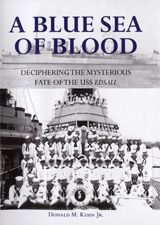

A Blue Sea of Blood, Deciphering the Mysterious Fate of the USS Edsall by Don M. Kehn.
Edsall sailed from Philadelphia 6 December 1920 for San Diego on shakedown. She arrived at San Diego 11 January 1921 and remained on the west coast until December, engaging in battle practice and gunnery drills with fleet units. Returning to Charleston, S.C., 28 December, Edsall was ordered to the Mediterranean and departed 26 May 1922.
Arriving at Constantinople 28 June, Edsall joined the U.S. Naval Detachment in Turkish Waters to protect American lives and interests. The Near East was in turmoil with civil strife in Russia and Greece at war with Turkey.
She did much for international relations by helping nations to alleviate postwar famine in eastern Europe, evacuating refugees, furnishing a center of communications for the Near East, and all the while standing by for emergencies. When the Turks set fire to Smyrna (Izmir), Edsall was one of the American destroyers that evacuated several thousand Greeks. On 14 September 1922 she took 607 refugees off Litchfield (DD-336) in Smyrna and transported them to Salonika, returning to Smyrna 16 September to act as flagship for the naval forces there. In October she carried refugees from Smyrna to Mytilene on Lesvosis. She made repeated visits to ports in Turkey, Bulgaria, Russia, Greece, Egypt, Palestine, Syria, Tunisia, Dalmatia, and Italy, yet managed to keep up gunnery and torpedo practice with her sisters until her return to Boston for overhaul 26 July 1924.
Edsall sailed for the Asiatic Station 3 January 1925, joining in battle practice and maneuvers at Guantánamo Bay, San Diego, and Pearl Harbor before arriving Shanghai, 22 June. She was to become a fixture of the Asiatic Fleet on the China coast, in the Philippines and Japan. Her primary duty was protection of American interests in the Far East, expanding constantly since acquisition of the Philippines. She was faithful guardian through civil war in China, and the Sino-Japanese War. Battle practice, maneuvers and diplomacy took her most frequently to Shanghai, Chefoo, Hankow, Hong Kong, Nanking, Kobe, Bangkok, and Manila.
When the Japanese attacked Pearl Harbor 7 December 1941 Edsall readied for action with DesDiv 57 at the southeast Borneo oil port of Balikpapan. She raced to Singapore, embarked a British liaison officer and four men to search for survivors of HMS Prince of Wales and HMS Repulse, sunk off Malaya the 10th. She intercepted a Japanese fishing trawler with four small boats in tow and escorted them into Singapore. She joined Houston (CA-30) at Surabaya to escort shipping retiring to the relative safety of Darwin, Australia. While so serving, she became the first U.S. destroyer to sink a full-sized enemy submarine in World War II. With three Australian corvettes, Edsall sent I-124 to the bottom on 20 January 1942 off Darwin.
Continuing to escort convoys in a race against time, Edsall was damaged when one of her own depth charges exploded prematurely during an antisubmarine attack 19 February 1942. She gamely continued to operate off Java, then on 26 February steamed from Tjilatjap to rendezvous with Langley (AV-3). The 27th, the seaplane tender and escorts Edsall and Whipple (DD-217) were attacked by nine large twin-engine bombers which damaged the historic Langley so badly she had to be abandoned. Edsall picked up 177 survivors, Whipple 308. On the 28th the two destroyers rendezvoused with Pecos (AO-6) off Flying Fish Cove, Christmas Island. More Japanese bombers forced Edsall to leave before transferring all Langley men, but she completed the job on 1 March; then headed back to Tjilatjap. She never arrived. The gallant old four-piper fought a hopeless action against Japanese battleships Hiei and Kirishima, who sank her on the afternoon of 1 March 1942.
Edsall received two battle stars for World War II service.